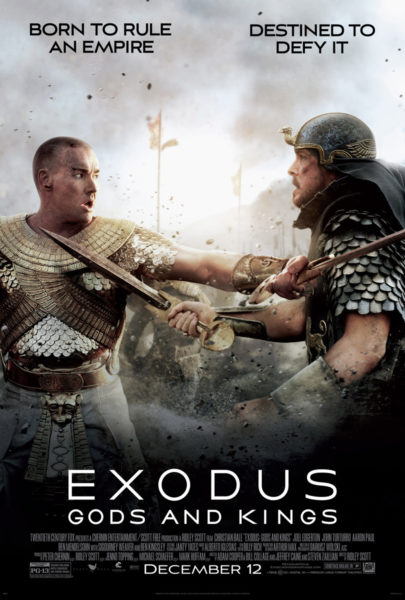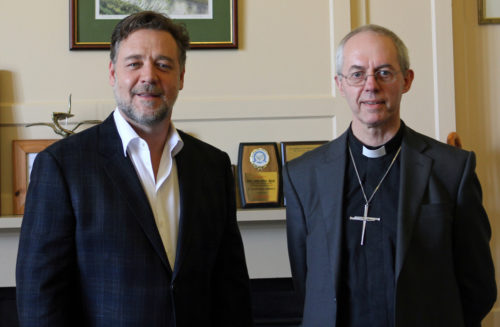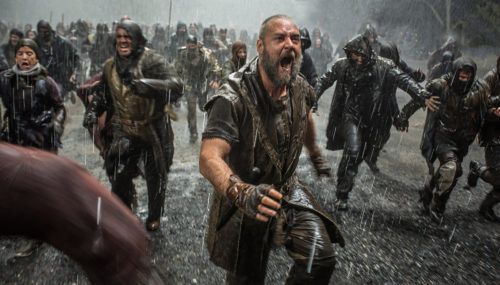Religious-themed movies – helping or hurting the Christian story?Posted Dec 16, 2014 |
|
 [Episcopal News Service] The latest in a slew of religious-themed films this year, “Exodus: Gods and Kings” starring Christian Bale as Moses, opened Dec. 12, but can it and others of its genre be considered Christian movies? And do they help – or hinder – the telling of the biblical story?
[Episcopal News Service] The latest in a slew of religious-themed films this year, “Exodus: Gods and Kings” starring Christian Bale as Moses, opened Dec. 12, but can it and others of its genre be considered Christian movies? And do they help – or hinder – the telling of the biblical story?
Some Episcopalians, like Faith Bryant of Highland, California, believe Hollywood’s creative license with movies like “Noah,” released in March and starring Russell Crowe as the ark-building patriarch, wreak havoc with beloved Bible stories.
But others say making connections matters. That, if the movies – loyal or not to biblical accounts – can lead to deeper engagement of faith or even steer the uninitiated in the church’s direction, all the better.
Lisa Brown, director of children’s ministry at St. Paul’s Episcopal Church in Mount Lebanon, Pennsylvania, held a red carpet gala and other activities after “we had children coming out of the woodwork” when “The Fault in Our Stars” was filmed at the church.
The Rev. Alex Riffee, who is set to launch a “Movie Theology Ministry” in January at St. James Church in Louisa, Virginia, considers that even the raunchy television series “South Park” can invite deeper conversations about the faith.
Telling the story, or not
A long-time Episcopalian, Bryant said she eagerly anticipated viewing the epic movie about “Noah,” the beloved biblical story she learned as a child. It starred Crowe, who held a widely publicized meeting with Archbishop of Canterbury Justin Welby after the film’s premiere, to talk about faith and spirituality.

Russell Crowe meets with Archbishop of Canterbury Justin Welby at Lambeth Palace, the Archbishop’s official residence, on Tuesday, the day after attending the film’s premiere in London Photo: Lambeth Palace
But Bryant didn’t find much faith or spirituality in the movie, and it didn’t receive particularly good reviews. She said it has inspired her own exodus – from Hollywood-style religious movies altogether.
“There were a lot of things in the movie that were false,” recalled Bryant, 55. “They portrayed Noah as somebody who was maybe a little crazy. They didn’t portray him as an upright, righteous person. It was disturbing. It was almost a bit sci-fi. A person who sees the movie first and then reads the Bible will say, ‘No, that’s not like the movie. Where’s all the stuff that was in the movie?’ ”
“Noah” and “Exodus: Gods and Kings” aren’t the only recent big screen attempts to re-tell biblical stories. Within the past few months, a spate of religious-themed Christian movies has included “Son of God” produced by former “Highway to Heaven” star Roma Downey and “Left Behind” starring Nicholas Cage, echoing the Rapture.
And now there’s a priest turned moviemaker (see related story), the Rev. Paul-Gordon Chandler, who is co-producing “Ports of Call,” an interfaith love story which is more about building bridges than incorporating religious themes.
Riffee says rejecting such movies outright without considering their potential to make connections between church and secular worlds is a missed opportunity.
And while he didn’t think “Noah” was a particularly good movie, “if nothing else it was meant to be entertaining, which is what Hollywood’s trying to do,” he said. “We have to remember they’re not trying to tell the story from a faith perspective at all.
“That means they change the story based on what people want to see and hear” but the popularity of such movies can “also be a conversation-starter for people to open up the Bible in the first place,” added Riffee, 28.
He hopes to use his “movie theology ministry” to engage families and children, because biblical themes are prevalent in all sorts of media, and whatever the movie, “if we believe with our lens that there is always a connection we can engage the entire world and find holiness in it.”
For example, he said, “Noah” could be considered through the lens of maintaining creation and even become an entrée to a discussion about global warming and environmental justice.
He believes it’s good that “they’re even trying to do the stories. Whether the church goes and sees it or attacks it, people are going to see it and we have no control over that. Some will see [“Exodus: Gods and Kings”] because they like Christian Bale. We can do something about it in responding to it happening, engaging it, dispelling some of the stuff we don’t think it’s really trying to say.”
Even television programs such as “South Park,” often considered “one of the worst shows on TV,” spark worthy conversation, Riffee said. “I wasn’t allowed to watch it, I had to go to a friend’s house to see it, but the idea was to express a point by showing extremes to the ridiculous.
“If you’re able to get past that, they actually have something deep and meaningful to say, and they also engage a lot of religious topics. There’s always a nugget you can take away, because they try to portray a central truth that everybody hopefully can agree upon.”
Missouri ‘film forum’ guides believers on journey of discovery
Jim Andris, 76, of St. Louis, Missouri, said the first time he saw the epic “The Ten Commandments” starring Charlton Heston, he believed the movie was gospel.
“Since then I’ve traveled a long path of spiritual investigation,” Andris told ENS. “I grew up on those grand Hollywood visions of the patriarchs in the Bible. At the time, I saw those movies as helping us. I uncritically saw them as doors into understanding the message of the Christian scriptures.”
Now, he views the movies, as well as the biblical stories themselves, as intending “to tell us something about the way we should live our lives. There’s some truth, if we dig for it; we each have our own interpretation.”
Besides, said the retired university professor who now attends Trinity Episcopal Church in East St. Louis, “there’s this fascination with holy battles, or with right-versus-wrong battles where you see hour after hour of the most incredible, unbelievable carnage … with louder sound, and unbelievable graphics. At one level, I think it’s all just baloney. I can be entertained, but that doesn’t get us closer to the truth.”
He added that “the actual truth of Jesus Christ is not very exciting. Jesus Christ gave a nonviolent example and Hollywood seems to be obsessed with violence.”
He credits a film forum series offered by another Trinity parishioner and long-time film critic Martha Baker with inviting deeper understanding of his own faith and theological themes in movie messages.
Baker, a KDHX-St. Louis Radio film critic, has reviewed movies since 1977 and “purposely steers clear of films like ‘Noah’” for discussion by the parish forum.
“I never have purposefully selected a film with what one might call a religious theme except maybe “The Way” with Martin Sheen,” the film about his character’s pilgrimage walking Spain’s El Camino de Santiago de Compostela, said Baker. “The other was a film about Hildegard of Bingen. Both were fabulous in and of themselves.”
But some movies, like Mel Gibson’s 2004 “The Passion of the Christ,” she believes, actually hurt the Christian message. “It was one of the worst movies ever made, generally, and then when you add the specifics of the Christian part of that tone, it does more damage than good. It was hurtful to the greater Christian message.”
Using ‘Fault’ to reach out to young people
Director of Children’s Ministry Lisa Brown maximized the opportunity for discussion and for outreach when the movie “The Fault in Our Stars” was filmed at her parish.
 Released in June, the movie was based on the book of the same name, by Episcopalian John Green.
Released in June, the movie was based on the book of the same name, by Episcopalian John Green.
“He was named one of Time Magazine’s 100 Most Influential People. He’s known for his Crash Course videos on YouTube, mostly history lessons, and kids watch. Anytime you have an opportunity for the church to be connected to something so culturally relevant, we have an opportunity to reach out to a lot of kids.”
Although some were disappointed in the film’s portrayal of church and clergy, the movie sent a powerful message in a time when many young people may view the church as irrelevant or ineffective, Brown said, because the young couple returned to the church at a crucial moment in the movie.
Her youth group “was giddy to have something so tremendously cool associated with their church,” she recalled.
The church staged a premiere of sorts the evening of the film’s release, with a red-carpet gala open to all young people, Brown said. “We worked with a local movie theater, we rented a red carpet, the congregation made appetizers and food. Some kids wore prom apparel, some T-shirts,” she said.
It was a wonderful experience, but Brown said that, while “you can look at any movie through a Christian lens or perspective, I’m always leery because I think sometimes there’s a lot of reinterpretation that is not necessarily reflective of the way I’d use the story as a Christian educator.
“There’s such a broad spectrum of even Christian beliefs … that I don’t want someone to make assumptions about what I believe based on what was portrayed in a movie. Anytime you take a story out of context, it can be problematic.”
– The Rev. Pat McCaughan is a correspondent for the Episcopal News Service.



Social Menu